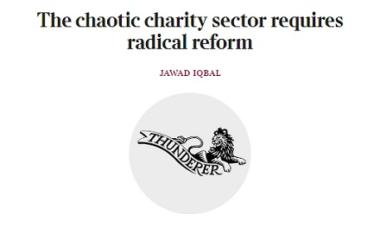The Times' criticism of the charity sector identifies some of the right problems, but not the right solutions, says David Ainsworth.
Yesterday The Times newspaper carried another attack on the charity sector, saying it was chaotic and in need of radical reform.
The basis for the latest critical opinion piece was the collapse of the charity Lifeline Project, which appears to have scaled up to meet growing need - and to deal with the fact that contracts are getting bigger and bigger - but then ran out of road after finding it harder and harder to meet ridiculous government commissioning requirements.
The newspaper pointed to the fate of children's charity 4Children last year, as well as the failures of LGBT charity Broken Rainbow and the now-infamous Kids Company, and evinced a trend. All four had received government cash. Therefore the sector has become too reliant on government money, and something needed to change. The paper's columnist did not really say what, although there was some mention of unspecified reforms to governance, and a definite undertone that government must step in and sort charities out.
Presumably, since the charity sector is too "chaotic", government should provide more funding for the Charity Commission, which could then step in and enforce some sort of order, rather like a teacher in a playground, getting all the naughty charities to line up against a wall.
The problem with this article - and too many like it, in too many national newspapers - is that it gets a grip on a genuine problem, but misdiagnoses the causes, and provides nothing useful by way of a solution.
The phrase "charities have become too reliant on public money" is one which has become fashionable with the right wing commentariat - and the green ink brigade who like to share their views underneath. Its companions, "charities have become too much like businesses" and "there are too many charities", similarly speak to a vague public unhappiness with the status quo, and a desire for the government to do something about it.
The writer clearly feels that charities should get less government funding. It is not clear whether the message is that charities should just make do with less cash, or whether they are just being foolish in not finding it elsewhere. Either way, this is not a stance the sector is likely to support.
In a way, this article is encouraging, though it maybe does not feel like it. It is a reminder that the charity sector exists for the public good, and the public are therefore rightly interested in ensuring its effective administration. The press, as their agents, are right to apply some scrutiny. Unfortunately many in the press and the public seem to lack expertise, but they will only obtain it by engaging in the issues.
Public funding needs reform
So The Times’ diagnosis of the problem is partially correct, and its solutions limited. But what should actually be done?
Well, the article calls for governance reform, including more open trustee recruitment. This is an excellent idea which the sector is already taking in hand – albeit slowly – but it is unlikely to be a panacea.
The article also calls for more funding for the Charity Commission. This probably won’t do what the writer wants, but I think we all agree that would be an excellent use of public funds.
But the really pressing issue is statutory funding.
The article correctly identifies that all four charities it mentions had public funding issues, although those issues were rather different: Lifeline and 4Children were squeezed out by a contracting environment which has become too tight. Kids Company and Broken Rainbow were flamboyant, wasteful, poorly run charities - grant-funded pet projects on which government spent liberally because they ticked political boxes, which should never have had a penny.
In all four cases - and thousands of others like them - government should indeed have done something. It should have provided sensible funding.
Good statutory funding is big ask – probably well beyond the means of the government to deliver. We need to see better training for commissioners, a move away from payment by results, a smaller-by-default approach to procurement, and better co-commissioning. We could do with a reinforcement of the Compact, and a stronger Social Value Act.
But fundamentally the problem is that there isn't really enough money to go around and the government is trying to make it stretch too far. Charities are being asked to do more with less because the Graph of Doom shows local government running out of money sometime very soon, and that pain is being passed on. As and when the books more or less balance, things should get a bit more sensible.
In the short term, the emphasis has to be on grant funding. Government does not give enough grants – the fashion has been to move away – and when it does, its approach is too scattergun, too focused on pet projects. We need to persuade central government to launch strategic, large-scale grant funding.
This also sounds like a big ask, but it can be done. The Arts Council is not without its problems, but it is still an excellent example of how a sector can be funded. If such a fund could be replicated in areas like drug rehabilitation, or offender management, or homelessness, it would give the sector far more freedom to do what it does best – create new, intelligent, innovative solutions to deep-seated social problems.
Related articles











